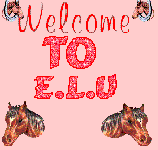Whistling and Roaring
E.L.U Equine Lovers Unite :: You and Your Equines :: Equine Health :: Equine Health ~ read only articles
Page 1 of 1
 Whistling and Roaring
Whistling and Roaring
Whistling and Roaring
Horses that make an abnormal inspiratory (breathing in) noise during exercise are termed either "whistlers" or "roarers". This noise is only heard during the inspiratory phase and can sound like anything between a high pitched whistle to a loud roaring sound.
What causes whistling and roaring?
Anything that interferes with the normal flow of air from the nostrils to the lungs can cause a noise. The most common cause of horses developing these noises is a condition called laryngeal hemiplegia. This condition is caused by one of the two vocal chords in the larynx (voice box or adams apple) becoming paralysed. This is thought to be due to injury to a nerve called the recurrent laryngeal nerve which runs up the neck of the horse.
Another condition called epiglottic entrapment can cause whistling and roaring and occurs when the epiglottis (a piece of tissue in the throat) becomes trapped and can not be moved. Other causes of whistling and roaring include tumours, cysts in the larynx, infection and congenital problems (birth defects) of the larynx.

What are the signs of whistling and roaring?
The main sign is, of course, an abnormal noise on inspiration. When the condition is mild, noise may only be heard when the horse is exercising strenuously. However as the condition develops the noise may become evident even during the trot.
What can I do to prevent whistling and roaring?
Nothing can be done to prevent this condition but early diagnosis and treatment can prevent further complications from developing. Surgical treatment (known as a 'tie back') usually results in a complete resolution. It is also believed that this condition is hereditary. Do contact your veterinary surgeon for further advice if you suspect your horse may be suffering from this condition.
Horses that make an abnormal inspiratory (breathing in) noise during exercise are termed either "whistlers" or "roarers". This noise is only heard during the inspiratory phase and can sound like anything between a high pitched whistle to a loud roaring sound.
What causes whistling and roaring?
Anything that interferes with the normal flow of air from the nostrils to the lungs can cause a noise. The most common cause of horses developing these noises is a condition called laryngeal hemiplegia. This condition is caused by one of the two vocal chords in the larynx (voice box or adams apple) becoming paralysed. This is thought to be due to injury to a nerve called the recurrent laryngeal nerve which runs up the neck of the horse.
Another condition called epiglottic entrapment can cause whistling and roaring and occurs when the epiglottis (a piece of tissue in the throat) becomes trapped and can not be moved. Other causes of whistling and roaring include tumours, cysts in the larynx, infection and congenital problems (birth defects) of the larynx.

What are the signs of whistling and roaring?
The main sign is, of course, an abnormal noise on inspiration. When the condition is mild, noise may only be heard when the horse is exercising strenuously. However as the condition develops the noise may become evident even during the trot.
What can I do to prevent whistling and roaring?
Nothing can be done to prevent this condition but early diagnosis and treatment can prevent further complications from developing. Surgical treatment (known as a 'tie back') usually results in a complete resolution. It is also believed that this condition is hereditary. Do contact your veterinary surgeon for further advice if you suspect your horse may be suffering from this condition.
E.L.U Equine Lovers Unite :: You and Your Equines :: Equine Health :: Equine Health ~ read only articles
Page 1 of 1
Permissions in this forum:
You cannot reply to topics in this forum|
|
|
